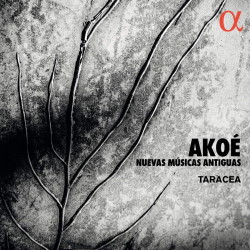Akoé: Nuevas Músicas Antigua
Isabel Martín (voice, percussion) David Mayoral (percussion) Michel Godard (serpent)
Taracea
All arranged by Rainer Seiferth
rec. 2019, El Planchón, Cáceres, Spain
Tracklist and performance details follow review
ALPHA 597 [51:13]
Alpha’s cover for this disc does it few favours in practical terms. Like every artefact from this source the artwork is certainly eye-catching, but the five words on the cover (AKOÉ: Nuevas Músicas Antigua – Taracea) give little away and If you have never heard of the ensemble – or didn’t know what instruments might be involved it would be easy to overlook this lovely disc. I suppose the Spanish title (broadly translated as ‘Old Music in a New Form’) gives a bit of a clue but otherwise one has to consult the back of the product to get a list of the composers featured -they span a period of 500 years up to and including Dowland – and the instrumentarium. Taracea, the core group (their rather beautiful name is Spanish for ‘marquetry’) are a trio consisting of the arranger Rainer Seiferth on vihuela, Belén Nieto on recorders and traverso and Miguel Rodrigáñez on double-bass. They are supplemented on many of the numbers by guests; David Mayoral on percussion, Michel Godard taming a rather earthy serpent and, in a spellbinding account of Juan de Encina’s ¡Ay triste que vengo! Isabel Martín provides an alluring vocal. Seiferth’s brief introductory note acknowledges the central role of his own instrument and its nocturnal, ‘lullaby-ing’ qualities and describes the eleven numbers on the disc (many are well-known in their original forms) as “the standards of their day”. The title of the disc Akoé is a Greek word which defies easy translation – ‘remembered sound’ is the phrase presented in the booklet; it goes some way to characterising the arrangements herein. Each of them exudes a most agreeable quasi-improvisational spontaneity, the results of a sequence of intensive ‘jam’ sessions. They are delightful without exception.
An unassuming little Dowland prelude gently rendered on recorders and vihuela acts as a tiny entrée into the programme proper and aptly it’s one of Dowland’s own most famous songs. Come again, sweet love doth now invite. Seiferth’s version swings and lilts and constitutes a delectable reconfiguration of its ample charms. Perhaps my response to this number is rather personal, but if, as Mario Muñoz Carrasco’s accompanying essay suggests Akoé is about liberating the spirit of familiar music, and by extension making links to other sonic memories via Taracea’s reimagined blends of colour and pulse, I found myself unexpectedly unearthing a direct line between John Dowland and his spiritual descendent from 400 years later, the ill-starred singer-songwriter Nick Drake (1948-74). Quite apart from the emotional overlaps shared by the lyrics and impressions of Dowland’s and Drake’s songs themselves, I noticed a serendipitous link between the sound of Miguel Rodrigáñez’ double-bass on the new disc and Danny Thompson’s bass on Drake’s first album Five Leaves Left (1969), while David Mayoral’s nature-infused percussion projects eerie echoes of Ricky Dzidzornu’s work on the same record. This shared ambience extends beyond the Dowland song and is perceptible in many of the other tracks on Akoé; sounds which hang in the air on a balmy evening in the company of a decent bottle of red, but music whose apparent lightness of being disguises something deeper and more personal which to my ears seemed doubly apparent when playing the disc through again.
The democracy of jazz is applied to many of the tunes here. If Seiferth’s vihuela constitutes the hub of all these arrangements, the other players enjoy plenty of moments in the sun. Thus in Caccini’s Amarilli, mia bella we are introduced to the distinctive flavours of Michel Godard’s earthy serpent, whose rough diamond charm inhabits a no-man’s land between trumpet and sax, at times resembling either or neither. Here it bears the melodic weight of Amarilli along with Belén Nieto’s dusky recorders, while the whole edifice is held together by Rodriguaniez’ cool, reliable bass. This is perfect late-spring lockdown evening renaissance jazz. An old, anonymous tune Cuchilleros follows, sinuous and gentle before Mayoral’s percussion starts to dominate and Nieto really lets her hair down. Background vocals contribute to its oddly Moorish colours and its haunting impact. A realisation of Heinrich Isaac’s plaintive Innsbruck, ich muss dich lassen marks a change of place and pace. The distance between Innsbruck and Extremadura (where Akoé was recorded) is as cultural as it is physical, but these channels are seamlessly bridged by an arrangement which retains the stateliness of the original while somehow exuding the rays of a Western Spanish sunset. Some hip bass improv over a serpent drone kicks off the arrangement of the familiar baile Marizápalos, although the recorders subsequently seem to transport us to Elizabethan England. The tune really suits the sound of the serpent; at 2:47 there’s something of a big ‘rock-out’, a colourful change of emphasis that’s most tastefully effected. In what must be another exceedingly personal, subconscious recollection, this number reminded me of the Esbjorn Svensson Trio!
The second half of the disc is more elusive. Juan del Encina’s little villancico ¡Ay triste que vengo! is transformed from a rocking vihuela-accompanied folk song chastely delivered by Isabel Martín into something more exotic, foot-tapping and sensual, while Josquin’s Phrygian chanson Mille Regretz is afforded an appropriately pastoral, sombre makeover, although Rodrigáñez adds a soupçon of swing. Contrastingly Adrien Le Roy’s Passamèze is initially buried in what seems like a free-jazz vibe until the tune bursts forth at 1:40 – Michel Godard’s serpent adopting a tone that owes more here to Miles Davis than to John Coltrane. The Hildegard prayer emerges as an ethereal vihuela workout over a bass drone which ensures it retains its ancient poise until the Rodrigáñez’ playing becomes more elaborate and the recorder briefly supplies the drone. O Quam mirabilis est thus remains meditative and dignified. Claudin de Sermisy’s rollicking Tant que vivray adopts folk-jazz stylings for the big finish; it incorporates subtle washes of percussion and some blistering jazz serpent (an unlikely three-word construction!).
Akoé adds up to a rewarding and comforting 50-odd minute set. The playing is stylish and subtle, Seiferth’s arrangements tasteful and ingenious, by turn sultry and stately. The recording is naturally warm – it conveys unambiguously a sextet of musicians who are clearly having a wonderful time. Nor does the listening experience pall on repetition – quite the opposite. The love of the members of Taracea and their friends for this repertoire is extremely contagious – in a good way. Listeners will not need to be told to “stay alert”.
Richard Hanlon
Contents
John DOWLAND (1563-1626)
Preludio [1:12]
John DOWLAND Come again, sweet love doth now invite [5:12]
Giulo CACCINI (1551-1618)
Amarilli, mia bella [6:28]
ANON.
Cuchilleros [4:52]
Heinrich ISAAC (c1450-1517)
Innsbruck, ich muss dich lassen [4:52]
ANON.: Marizápalos [6:21]
Juan del ENCINA (1468-1533)
¡Ay triste que vengo! [5:42]
Josquin DES PRES (c1450-1521)
Mille Regretz [3:19]
Adrien LE ROY (1520-1598)
Passamèze [3:40]
HILDEGARD OF BINGEN (1098-1179)
O Quam mirabilis est [3:46]
Claudin DE SERMISY (c1495-1562)
Tant que vivray [5:43]
Performers
Rainer Seiferth (Vihuela), Belén Nieto (recorders, traverso), Miguel Rodrigáñez (Double-Bass)























